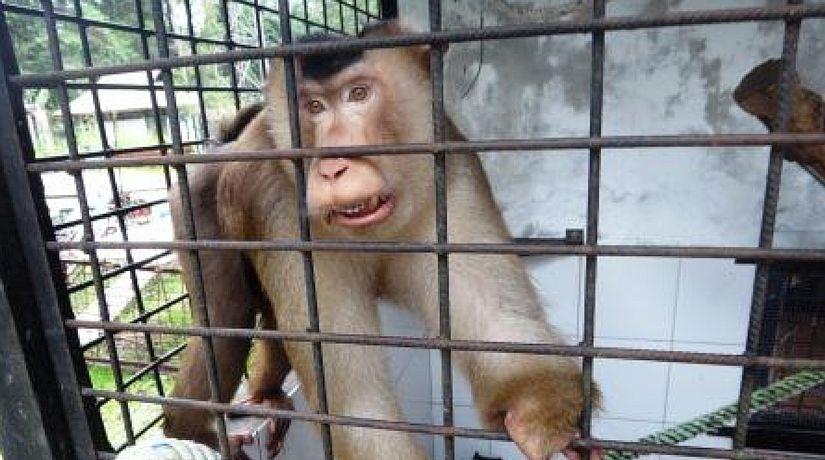
Matang has recently become home to a dominant male pigtail macaque, who has affectionately become known as Fang. He is in good condition, with the exception of his left forearm and hand which, as you can see from the accompanying photo, is quite disfigured. He has been checked over under sedation by a vet and though we had assumed the arm to be broken, it is actually in one piece. The bones are, however, quite badly twisted. Due to it only being this one area that is effected, we ruled out any kind of birth defect or done disease and hypothesise that this monkey has been kept on some kind of restraint – either chain or very strong rope – for a number of years. As he has grown up, we guess that continual tugging at and fighting against his restraint has caused this severe disfigurement of his forearm.
He still has limited gripping capability, can walk on it seemingly without discomfort and can weight-bear, though he favours his other arm. He also has a massively extended right canine, though the vet assures us this kind of over-growth is not too rare and causes no pain or disadvantage.
This brings to total of dominant male pigtails at Matang up to three, with the total population numbering ten. Of these, just two are female, and this presents a huge challenge in terms of socialisation.
In the wild, these macaques are highly sociable and troops, which can number from 9 to 80 individuals, are composed in the majority of females. Complex social structures are adhered to within these groups, and relationships are maintained through a variety of behaviours including gestures, vocalisations and physical contact. Groups are made up of a select few adult males, with one assuming dominance as the alpha. There is a linear structure of dominance, which is characteristic of macaque societies in general. Many adult females are present within a group, and it is structured according to matrilineal ranks. There is a structure of rank both within and between matrilines. Females remain within the group at maturity, and their rank is determined genetically; those born into a high ranking line will assume a position of high rank, and therefore power, within the group.
Clearly, our male: female ratio at Matang is converse to the ideal. When our new macaque cage has been constructed and we are looking to socialise these monkeys, we may well have to pick just one dominant male to reign over the group. Hopefully, he will keep all the younger males in check – in the wild, pigtails macaques have been documented to actively 'police' their troops to ensure fights do not get too serious, and this role does not just fall to the dominant male. Successful socialisation is a vital step towards being able to release any of these macaques – solitary individuals, if released, gravitate towards humans and end up being 'pests', and dealt with accordingly.
Fang is rapidly becoming a favourite of volunteers at Matang, as he has a very sociable personality. Macaques display a wide range of vocalisations and facial expressions to communicate with other members of the troop and facilitate social cohesion, and it seems Fang is trying to ingratiate himself among the human 'troop' he often sees around him. Future volunteers can look forward to meeting him; he is quite charming, in his own strange, slightly deformed way.














